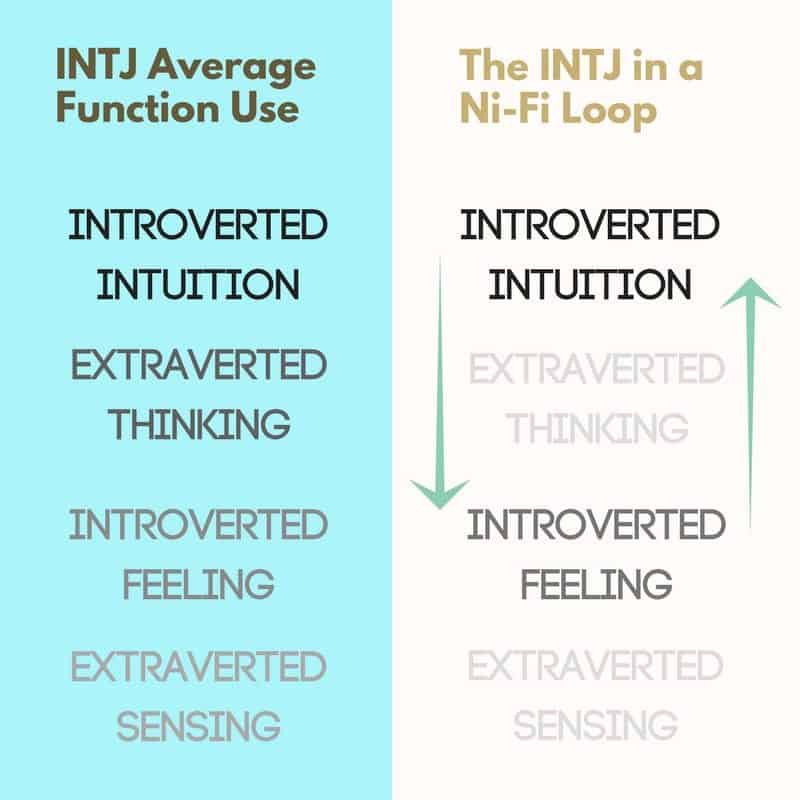Can your Myers-Briggs (MBTI®) character sort change? It is a query I get requested each day as an MBTI® practitioner. I come throughout individuals who say “I was an INFP, however now I’m an INFJ” or “I’m each an ISFP and an ESFP.” Is that this potential? Can you modify varieties or be two varieties? Let’s discover out!
Unsure what your character sort is? Take our new character questionnaire right here. Or you possibly can take the official MBTI® right here.

This text accommodates affiliate hyperlinks. If you buy an eBook from one in every of my hyperlinks I get a small share again to assist run my website.
Estimated studying time: 12 minutes
Can Your Myers-Briggs® Character Sort Change Over Time?
In response to Myers-Briggs principle, your character sort is inborn, and it doesn’t change. Nonetheless, the best way you exhibit your sort WILL change (and will) as you undergo life. Why? As you age and mature you develop totally different sides of your character sort.
Age and Your Cognitive Perform Stack
Each character sort has a cognitive perform stack. Consider this stack like a set of psychological instruments that you just’ve been utilizing your complete life with out even realizing it.
For instance, in case you’re an INFJ you’re dominant perform is Introverted Instinct. That is your favourite “instrument” and what has guided you in making insights, methods, and predictions your complete life. It’s the rationale that it’s simple so that you can sense how issues will unfold, to learn between the strains, and gauge deeper meanings. You might not consciously have realized you’re utilizing Introverted Instinct for this stuff, nevertheless it’s develop into a sample in your mind-set that’s grown and matured over time.
So all of us have this set of cognitive features: some we really feel extra certainty and confidence with, and others make us really feel extra unsure and susceptible.
Yow will discover out extra in regards to the cognitive features (and your particular stack) right here: The Cognitive Capabilities of Each Myers-Briggs Character Sort
To additional clarify, let’s use the instance of an INTJ. Right here is the INTJ perform stack:


INTJ Main Perform Stack
Dominant Perform: Introverted Instinct (Ni)Auxiliary Perform: Extraverted Considering (Te)Tertiary Perform: Introverted Feeling (Fi)Inferior Perform: Extraverted Sensing (Se)
After I took my MBTI® certification course I discovered that the features in our sort mature at totally different durations of our lives. From beginning to about age 7, the dominant perform develops. So a really younger INTJ can be wholly immersed in growing introverted instinct. We’d not see a lot considering, feeling, or sensing at a younger age (though they might nonetheless be in use, simply underdeveloped).
From 7 to age 20, the auxiliary perform develops (because the dominant perform continues growing). So at this age, we might see considering begin to develop extra. The INTJ would develop into extra logical with their intuitions, extra decisive, extra no-nonsense and structured.
In the course of the 20s, 30s, and 40s, the tertiary perform develops (because the dominant and auxiliary perform proceed growing). The INTJ would now begin to develop into extra involved with discovering their particular person ethics and private values. They’ve been influenced by this delicate perform earlier than, however they most likely felt awkward or dismissive of it.
In the course of the 50s, 60s and onward the inferior perform (extraverted sensing) develops as the opposite features proceed growing. The INTJ would now be extra tuned into the current, extra detail-oriented, fonder of dwelling within the second and benefiting from present alternatives.
How Age Impacts Your Perceived Character
After I was doing my coaching to develop into an MBTI® practitioner, we have been taught about how the totally different features in our character sort evolve and develop all through life.
In case you are an introvert (just like the INTJ we simply mentioned), you would possibly really feel extra extroverted as you develop Extraverted Considering or Extraverted Sensing. In flip, in case you’re an extrovert, you would possibly really feel extra introverted as you develop your introverted features. If you happen to’re a sensor you would possibly really feel extra related to instinct as you develop instinct. In distinction, in case you’re intuitive you would possibly really feel extra related to sensing as you develop sensing. If you happen to’re a thinker you would possibly really feel very in tune with feeling as that perform develops, and vice versa.
So it’s possible you’ll “really feel” like a unique sort at totally different ages as you develop the decrease features in your stack. All the identical, your dominant perform will nonetheless be your dominant. No different perform can have fairly as a lot aware energy as that perform. In the identical manner, your inferior will stay inferior, your auxiliary will stay within the help function, and your tertiary will stay the third-most potent perform in your stack.
Right here’s one other instance in case it’s nonetheless complicated. This time, we’ll use the ESFP for example. Right here is their main perform stack:
The ESFP Cognitive Capabilities:
Dominant Perform: Extraverted Sensing (Se)Auxiliary Perform: Introverted Feeling (Fi)Tertiary Perform: Extraverted Considering (Te)Inferior Perform: Introverted Instinct (Ni)
Let’s think about that we’re working with a 35-year-old ESFP. At this level in his life, he’s growing Extraverted Considering, as a result of that’s his tertiary perform. He takes the Myers-Briggs® check and exhibits a powerful desire for considering as a result of he’s actually delving into that perform proper now. The truth is, he will get an ENTJ sort consequence. However when he reads the sort descriptions he additionally feels a powerful connection to the ESFP sort. Which one is he? Is he a considering sort? Or is he an ESFP? Is he each? After extra analysis, he realizes he identifies extra with ESFP. However as a way to do this, he had to have a look at his complete life story relatively than simply the second he was in proper now.
Confusion like this occurs quite a bit, and it’s one of many explanation why studying in regards to the cognitive features is so necessary. If you already know which features you determine with and depend on extra, then that may make it easier to to outline your sort way more precisely than a easy check will.
How Life Expertise Impacts Your Character
Your life experiences additionally affect how your character sort develops. For instance, in case you’re a lady with a considering desire, however you’ve spent your whole life being socially conditioned to have feeling qualities, you might need developed your feeling facet since you felt pressured to attributable to societal expectations.
As one other instance, in case you’re a Feeling sort however your job requires you to deal with numerous metrics, construction, and logical evaluation, you might need developed your considering facet greater than the typical Feeling sort.
How Dominant-Tertiary Loops Influence Your Perceived Character
Dominant-tertiary loops happen once we bypass our auxiliary perform and loop forwards and backwards between our dominant and tertiary features. There’s a powerful temptation for all of us to enter these loops as a result of if we’re introverted, the loop is introverted, and if we’re extroverted, the loop is extroverted. So it feels simple and cozy to be in a loop.


What’s an angle?
If you happen to’re an introvert, your dominant and tertiary features can be introverted.
If you happen to’re an extravert, your dominant and tertiary features can be extraverted.
Extraversion and introversion are attitudes. One’s power flows inward (introversion), and the opposite’s power flows outward (extraversion).
Why Do We Wish to Enter Loops?
If you happen to’re an introvert, you’ll at all times acquire probably the most power from remaining within the introverted angle. If you happen to’re an extravert, you’ll at all times acquire probably the most power from remaining within the extraverted angle. The auxiliary and inferior features can drain us generally as a result of they’ve a unique angle than we choose. For instance, as an INTJ I usually really feel tempted to immerse myself wholly in instinct and feeling, as a result of they’re each introverted for me (INTJs have introverted instinct and introverted feeling). Generally I don’t really feel like embracing Extraverted Considering (my auxiliary perform) as a result of it’s in my non-preferred angle and doesn’t really feel as “me” as instinct and considering do. So if I get caught in an intuition-feeling loop I’d check as INFP or INFJ as a substitute of INTJ. Or I’d resolve that I’m an INTJ and an INFJ (I’ve seen folks do that).
However am I actually two varieties? No. I’m simply bypassing my auxiliary perform and looping forwards and backwards between instinct and feeling. Often, this ends in stunted improvement and warped views. Why? As a result of if I keep in an introverted loop I’m not balancing my heady intuitive perceptions with real-world experiences, details, and concrete particulars. So my insights develop into increasingly indifferent from actuality.
We have to develop each our introverted and extraverted features, and once we don’t, we find yourself skewing our perspective of the world round us.
The Draw back of the Loop:
Extraverts in an extraverted loop develop into too hasty, too wrapped up in performing, doing, and interacting with out reflecting and contemplating. Introverts in an introverted loop develop into too caught in their very own subjective world; they lose observe of an goal focus, real-world experiences, or taking motion on their concepts and views.
The Tertiary Perform and Mistyping
One of many different frequent causes that folks can determine with two varieties or mistype themselves is that they’re drawn to their tertiary perform. Most of us take pleasure in utilizing our tertiary perform; in actual fact, that’s why it’s known as the “reduction” perform. The tertiary perform offers reduction and is a manner that we are typically inventive and playful. That is why psychologist John Beebe known as the tertiary perform “the everlasting little one.” We regularly determine with the tertiary perform in a deep manner as a result of it’s in our most popular angle (if we’re introverted, it’s introverted, and so forth,.) and in addition as a result of we are likely to get pleasure out of tinkering and fascinating with this perform in every day life.
Because of this, I see might ISXPs sort as INJs. ISPs have tertiary introverted instinct so many occasions they’ll sort as INTJs and INFJs as a substitute of ISPs. I additionally see ESJs mistype as intuitives as a result of they’re growing instinct as their tertiary perform and are subsequently drawn to some intuitive methods of considering. Generally INPs can mistype as ISJs after they’re growing introverted sensing.
In mid-life particularly, many people can mistype as they develop their tertiary perform. EFPs would possibly sort as ETJs, ENJs would possibly sort as ESPs, and so forth,.
Your tertiary perform holds numerous attraction in mid-life. Yow will discover out what your tertiary perform is right here.
So in case you’re uncertain of your sort, take into consideration which perform comes probably the most naturally, with out even having to strive. The tertiary perform is enjoyable and inventive and playful, nevertheless it doesn’t perform as easily and effortlessly because the dominant perform does. It takes extra aware work to grasp.
The dominant perform is the perform you’ve lived and breathed for many of your life with out having to actually strive. It’s the perform that “leads the cost” when life feels chaotic; it’s regular, trusted, reliable, and straightforward to make use of in a constant manner.
The Judging/Perceiving Drawback
Many, MANY introverts get mistyped due to the confusion over the J/P desire. The J/P desire tells us how we’re oriented to the outer world, not how we’re oriented internally.
Most descriptions of judging varieties can be relatable to EJ varieties, however much less so to IJ varieties. In the identical manner, most descriptions of perceivers can be relatable to EP varieties, however much less so to IP varieties.
Why is that this?
IJ varieties have a dominant perceiving perform. They’re most content material and most in a position to enter a “circulate” state when they’re in a mode of notion, not judgment (decision-making). IJ varieties could be surprisingly gradual to make choices, they usually might choose to go away issues open-ended and ponder relatively than act, resolve, and set up. However as a result of IJ varieties have an extraverted judging perform, they’re listed as “J”‘s as a result of their first extraverted perform is one in every of judgment, not notion.
If you happen to’re confused you possibly can learn extra about this right here.
IP varieties can also mistype as IJ varieties as a result of IP varieties (INFPs, ISFPs, INTPs, ISTPs) have a dominant judging perform. Inwardly they could be way more decisive, agency on their opinions, and arranged than they appear outwardly. However as a result of their first extraverted perform is one in every of notion, they’re labeled as “P” varieties.
So it’s quite common for IJ varieties to narrate extra to perceiver descriptions and IP varieties to narrate to judging descriptions.
As Dr. AJ Drenth from Character Junkie says, “IPs are a mixture of J-P traits. Since their dominant perform is a Judging perform (Ti or Fi), they’re internal Judgers. IPs are way more severe inwardly than they seem outwardly. Fairly than remaining open to new info like wholesome EPs, they really feel pushed to maneuver towards closure and to have issues settled of their minds like EJs. “
And in describing IJs, Drenth says: “IJs are additionally a mixture of J-P traits. Outwardly, they appear like Judgers. They are often assertive and opinionated, even resembling EJ varieties. However since their dominant perform is a Perceiving perform (Ni or Si), they’re internal Perceivers. Certainly, they’re dominant Perceivers. So in actuality, IJs are far much less severe, closed, or judgmental than they could seem outwardly.”
Wrapping It Up…
As you possibly can see, there are a variety of causes that we are able to develop into mistyped or confused about which character sort is the most effective match. However needless to say you do have only one character sort, however with many sides and dimensions that provide you with depth and selection. That’s an excellent factor! If you happen to’re an ESTJ, for instance, you continue to use instinct and feeling. If you happen to’re an INFJ you continue to have perceiving and extroverted features. Realizing the complexity of sort helps us to understand the complexity of every particular person we meet alongside the best way!
What are your ideas?
Has this been useful? Has it confused you much more? Do you will have any ideas you’d like so as to add? Tell us within the feedback! Discover out extra about your character sort in our eBook, Discovering You: Unlocking the Energy of Character Sort.
References:
Are Personalities Everlasting? Can Your Character Sort Change
MBTI® Guide – A Information to the Growth and Use of the Myers-Briggs Sort Indicator® Instrument (CPP, Inc., 2009)
Rethinking Judging and Perceiving in Introverts – Character Junkie


Different Articles You May Take pleasure in:
Can Childhood Trauma Influence Your Character Sort?
Are Feelers Extra Emotional Than Thinkers?
Are Sure Character Sorts Smarter Than Others?
A Newbie’s Information to Figuring out Somebody’s Myers-Briggs® Character Sort


Subscribe to Our E-newsletter


Wish to uncover extra about character sort? Get the within scoop with Susan Storm on all issues typological, together with particular subscriber freebies, and reductions on new eBooks and programs! Be a part of our publication at this time!








